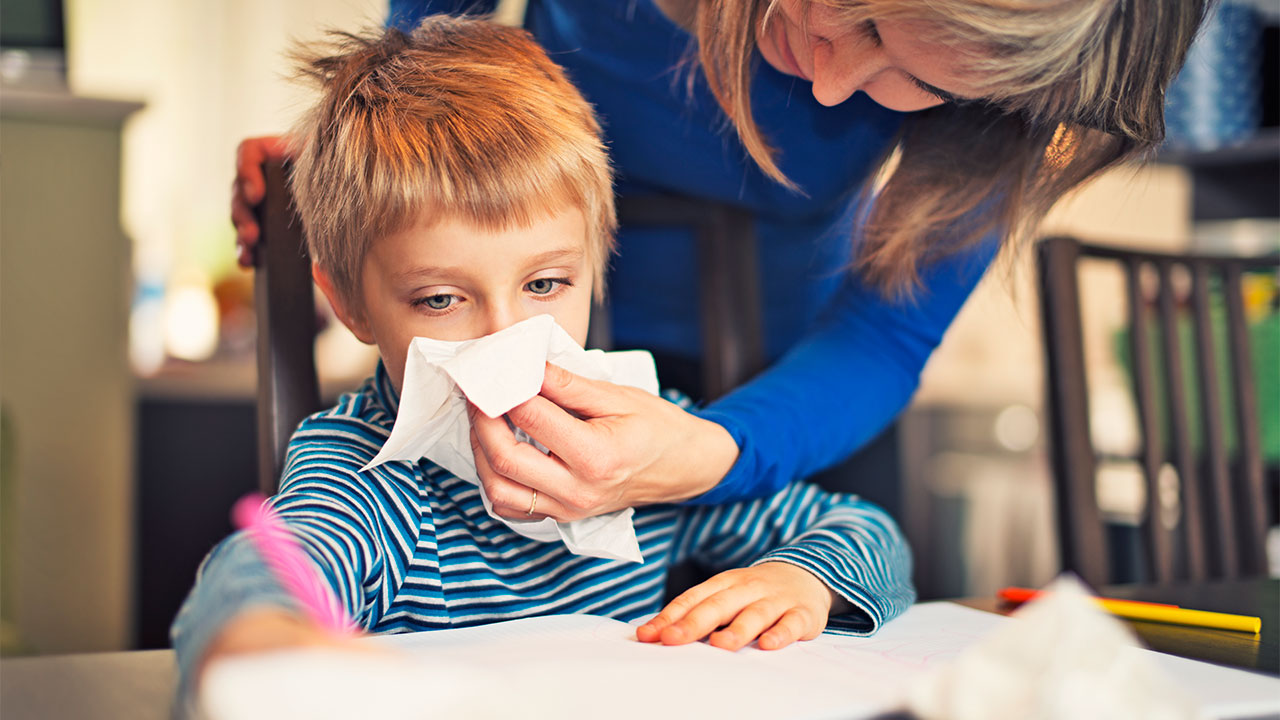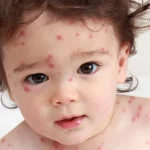
Key facts
- Most coughs and colds in children are caused by viral infections.
- Cold viruses are spread easily through droplets from the nose and mouth of infected people.
- Cold viruses can cause a runny nose, sore throat, cough and lethargy.
- The best treatment for a cold virus is to rest at home so your child’s immune system can fight the virus.
- Cough syrups and cold medicines are not considered effective or recommended for children.
What is the ‘common cold’?
The common cold is an infection caused by a virus. Hundreds of different viruses can cause colds and they usually affect the nose, ears and throat. They are easily spread from person to person through infected droplets from the mouth and nose. They can also be passed on through coughs and sneezes.
Colds are very common. Healthy preschool children often catch at least 6 colds per year. Sometimes, after recovering from a virus kids get sick with a new and different virus, so it can seem as though they are ‘always sick’. Children are more likely to catch a cold than adults because their immune system is still developing. Most children catch fewer cold viruses as they get older.
What are the symptoms of a cold?
Colds usually cause symptoms such as:
- blocked or runny nose
- sore throat
- coughing
- sneezing
- lethargy
Less common symptoms include:
- fever (high temperature)
- rash
- vomiting
- diarrhoea
If your child is unwell with symptoms of a cold, you may be concerned that they have COVID-19 since some cold and COVID-19 symptoms are similar.
Speak to your doctor if you are concerned about COVID-19. Many doctors prefer to see children with respiratory symptoms via telehealth to stop them spreading their illness. You should call your GP’s practice before attending with your sick child to see what their arrangements are.
What causes coughs and colds?
Most cough and cold symptoms are caused by viruses and cause a mild illness that goes away on its own without needing special treatment.
Colds are not caused by getting cold or wet, or by going out with wet hair or bare feet.
In some cases, cold symptoms can be caused by other conditions. These include:
- bronchiolitis (younger children) or bronchitis (older children)
- laryngitis
- sinusitis
- whooping cough
- pneumonia
- asthma
- croup
- COVID-19
Some of these conditions can be treated easily at home, but others may need treatment from your doctor.
How can I prevent coughs and colds?
It is not possible to prevent all coughs and colds, but there are things you can do to reduce the chance of your kids getting sick.
These include:
- frequent handwashing, especially after coughing, sneezing or blowing your nose,
- coughing or sneezing into your elbow,
- avoid sharing utensils and cups with others,
- using tissues instead of hankies and throwing them out straight away.
Eating a balanced diet and getting enough sleep will also help keep your children healthy.
There is some evidence that regular zinc and probiotic supplements may reduce the number of colds children get over time, but more research still needs to be done to confirm this. At this stage, Australian doctors do not recommend regular vitamin supplements for healthy children. You may wish to speak to your doctor if you are concerned or want more information.
When should I seek medical help for a cough or a cold?
You should visit your GP if your child is finding their symptoms very unpleasant, or at any stage if you yourself are concerned.
Be sure to seek medical attention if your child is very unwell with symptoms such as:
- wheezing
- a ‘sucking in’ of the skin around the throat or under the ribs when breathing in
- flaring of nostrils when breathing
- breathlessness (only being able to speak a few words at a time)
- fever with cold symptoms
These symptoms may mean your child’s illness is severe or is caused by something other than a cold virus. In this case, you may wish to discuss them with your doctor.
How are coughs and colds diagnosed?
In most cases, your GP can diagnose a cold by examining your child and asking you a few questions.
In some cases, your GP may refer the child for special tests such as a swab to test for COVID-19.
How are coughs and colds treated?
Most coughs and colds are caused by viruses and get better on their own within a week. If your child has a cold virus, antibiotics will not help them recover since antibiotics can only help treat bacterial infections.
Other medicines such as decongestants, antihistamines and cough syrups have not been shown to help children recover from coughs and colds and are not recommended for young children.
Vitamin supplements such as zinc, vitamin C and echinacea have also not been shown to help children recover from colds faster.
Special diets, or feeding your child more or less than usual (‘feed a fever, starve a cold’) have not been shown to have any effect on a cough or cold.
Humidifiers and steam treatments have also not been shown to have an effect on coughs or colds in children, although some parents find them helpful.
The best treatment for most coughs and colds is for your child to rest at home so their immune system can fight the virus. Making sure your child drinks plenty of fluids will help ease a sore throat and make a runny nose easier to blow. Saline nose drops or spray can also help thin mucus and make it easier to blow out. You can use a bulb syringe to gently suck mucus from your baby’s nose if they are too young to blow it themselves.
Honey has been shown to help ease children’s coughs, especially if given at bedtime. It can be given to children over 12 months of age.
Paracetamol or ibuprofen can be used to ease the pain of a sore throat or headache. The strengths of these over-the-counter medicines differ, so be sure to check the dose instructions on the pack and give your child medicines only as directed.
Coughs caused by other conditions, such as asthma or croup, are sometimes treated using inhalers or medicines such as steroids. Your doctor will prescribe these medicines and explain how to use them if they are needed.
What complications are linked to coughs and colds?
Most coughs and colds pass quickly with no medical treatment required and no complications.
In some cases, however, your child may develop a bacterial infection after being sick with a cold virus and the infection might then need medical treatment.
If your child’s symptoms do not improve within a week, or they get worse, or your child has a cough that continues for more than a few weeks after their illness, they should see a GP. The doctor may recommend some tests or treatments to rule out complications or another cause of your child’s symptoms.
When might my child need antibiotics?
Most coughs are caused by cold viruses, so antibiotics will not help your child get better any faster. Antibiotics are only used to treat bacterial infections.
A doctor may prescribe antibiotics when a cough is caused by a bacterial infection in the throat or chest, such as tonsillitis or pneumonia.
Other questions you might have
How can I help calm my child’s cough?
Cough medicines are not recommended for young children and can be harmful.
For children older than 12 months of age, a teaspoon or two of honey taken before bed can be useful in easing your child’s cough.
Avoid exposing your child to cigarette smoke since this can make their cough worse.
Is it alright to send my child to school if they have a cough?
If your child is unwell, you should keep them at home to allow them to rest and recover, as well as to prevent them from spreading their illness. Some children continue to cough for many weeks after an illness — this is known as a post-viral cough. If your child has a cough but is otherwise well, check with your doctor if they are able to attend school.




